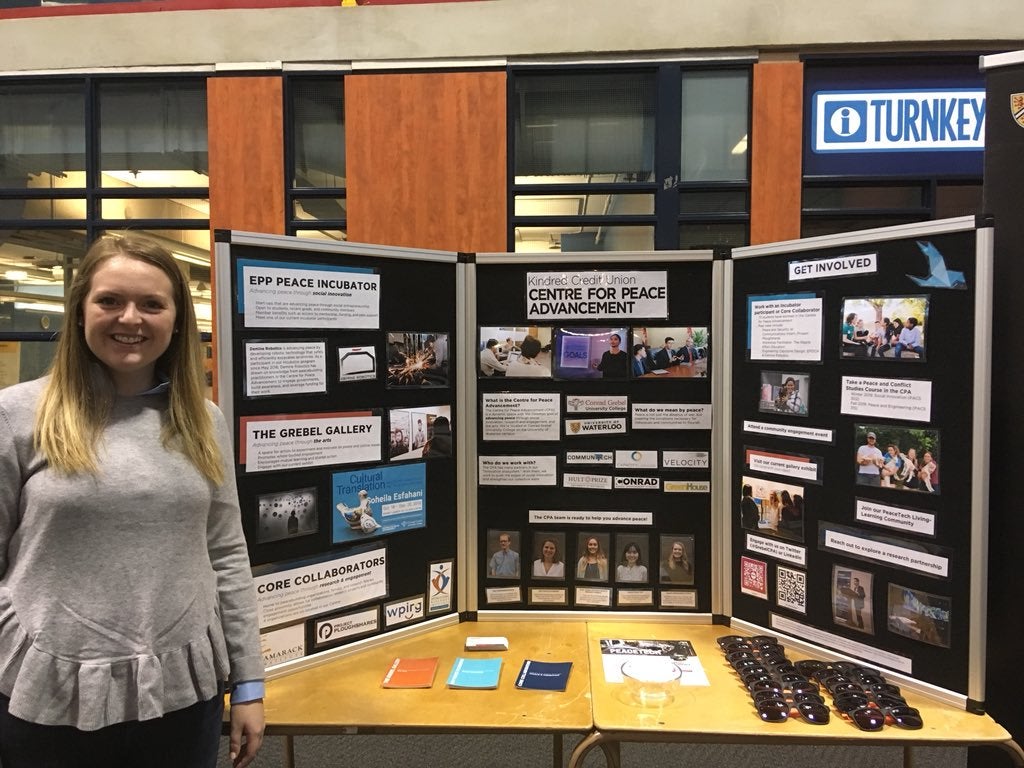Written by Hannah Hill, former Incubator Fellow at the Centre for Peace Advancement
When I was in high school, I always saw university as the next step for me. I was interested in both business and environmental studies and wanted to combine these disciplines with a co-op program. I knew the University of Waterloo was known as the “entrepreneurship school” and had tons of resources available for students who have an idea and want to put wheels to it.
When I received my offer to the Environment and Business program, I immediately said “yes” -- eager to learn more about this intersection and apply my studies in the real world. Since coming to Waterloo, I’ve tapped into this innovation ecosystem and have been exposed to some amazing opportunities. Living in residence at Conrad Grebel University College surrounded me with like-minded students who were eager to collaborate and solve real-world problems. The following is my story and there are so many similar (but different) ecosystem stories of fellow students. Could yours be the next one?
Fast forward to my first co-op term as a Marketing Assistant at Velocity. This role was a perfect fit for me from writing blog posts to promoting events on social media. It was at Velocity that I caught the “start-up bug” and became interested in ventures who wanted to make a social impact. I met Rachel Thompson of Marlena Books, an alumnus of the Epp Peace Incubator, who is a great example of someone doing just that.
Later that year, I travelled to San Antonio, Texas to attend the annual convention of Mennonite Economic Development Associates (MEDA). I was joined by other students from Conrad Grebel who were keen to learn about MEDA’s work of creating business solutions to poverty. Hearing stories of MEDA empowering entrepreneurs all around the world was incredibly inspiring.
I got so excited by MEDA’s work I decided to attend their convention again, this time with an idea for a social enterprise and an interdisciplinary team of Grebel students. We received mentorship and support from Director Paul Heidebrecht and the Centre for Peace Advancement, which helped us to win a pitch competition hosted during the convention. We were encouraged to keep working on our venture and even entered the World’s Challenge Challenge on-campus. While this idea never took off, I learned how to fall in love with the problem, what business models exist, what elements to include in a pitch, and how to leverage the strengths of a team.
On my next co-op term at Waterloo EDC, I learned to see the big picture of Waterloo’s innovation ecosystem and share it with those thinking about locating, relocating, or expanding to the Region. I started to understand just how dynamic and collaborative the system is with all players working together to make Waterloo the place to be for innovation.
The next stop on my journey was at the Centre for Peace Advancement in the role of Incubator Fellow. It was here that I got hands-on experience working directly with start-ups on meaningful projects, such as supporting Demine Robotic’s Kickstarter campaign and reaching out to bloggers and influencers to feature Marlena Books.

This is just the beginning of my story and I plan to stay connected to this truly one-of-a-kind ecosystem. For those who are interested in joining Waterloo’s innovation ecosystem but don’t know where to start, I invite you to learn more by attending an event or taking a course on-campus.
If you’re interested in the intersection between peacebuilding and social innovation, Paul or Amy would love to have a conversation with you.